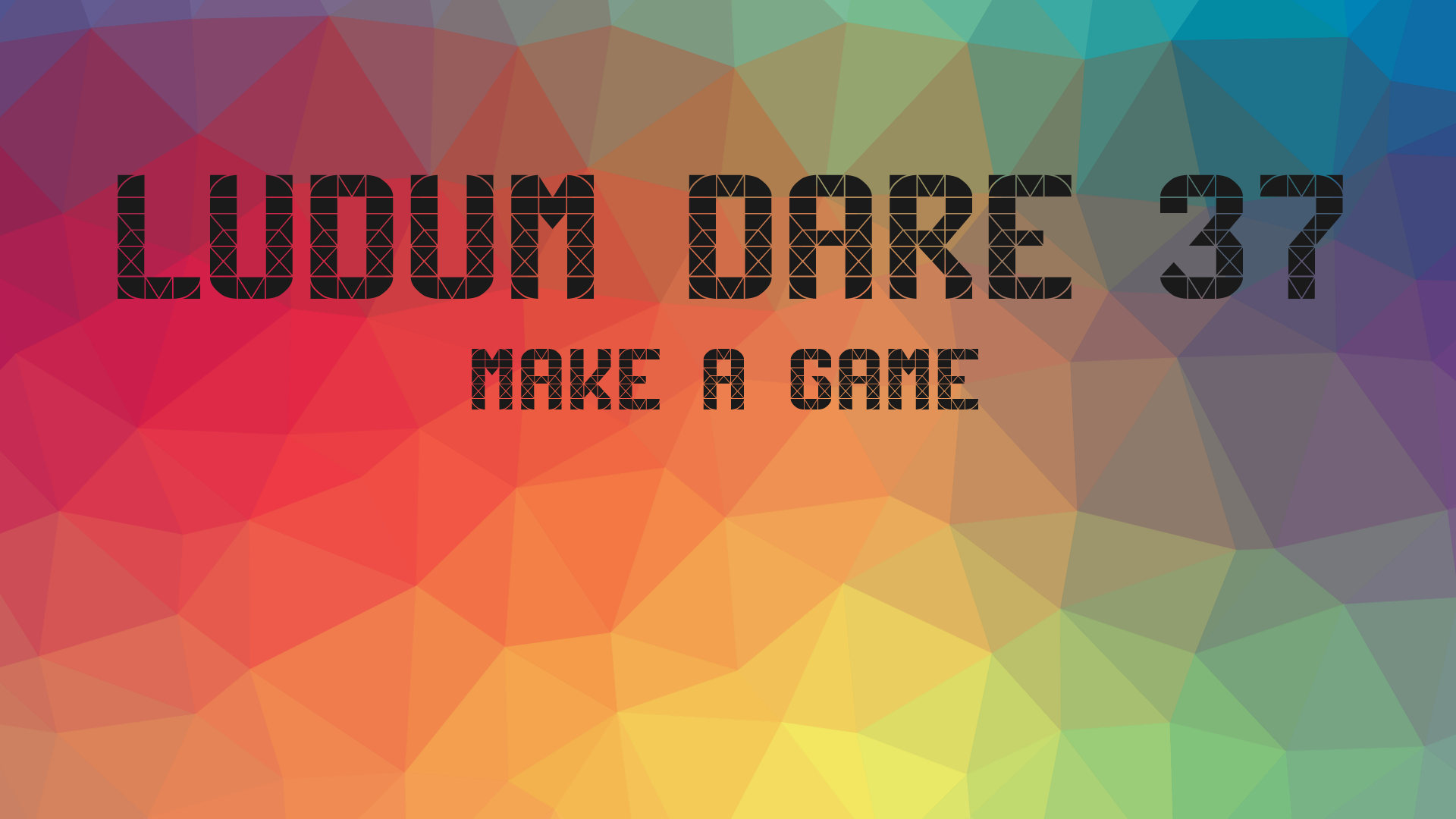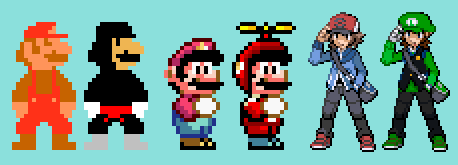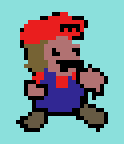Ludum Dare translation

Preface of the translator: until the next, the 37th in a row, the Ludum Dare contest is less than a week away (it starts at 05:00 am December 10, Moscow time ). I decided to translate the rules, because they have a lot of subtleties (especially in Compo terms). I think they will be useful to beginners in this most popular gamejam . So...
Ludum Dare Rules
Ludum Dare is a contest in which you can create a game on a given topic from scratch from scratch .
')
Topics are suggested and selected by the community. Suggested themes (Theme Suggestions) are accepted within 5 weeks before the start of the competition. Voting for topics (Theme Voting) continues for 2 weeks before the contest.
The topic becomes known at the beginning of the competition.
Games in Ludum Dare can be sent to one or two categories: Jam or Compo .
Jam
Jam is the Ludum Dare category for everyone. Teams, singles and in general all those who want to create something new can participate in it.
- Work alone or as a team.
- Create a game in 72 hours .
To create a game, you can use any tools and libraries. Allowed to start with any available base code.
Participants can use any third-party graphics, music and sounds, as well as pre-created resources. But we ask you to REFUSE PARTICIPATION (opt-out) in the respective voting categories (Graphics, Audio). You can unsubscribe from the category when you submit a game.
We strongly recommend using only the resources for which you have rights (resources in the public domain (Public Domain), licensed or created by you resources, etc.). If you do not have rights to use, then you are responsible for the violations.
All that is not a video game
Board and card games are allowed. But keep in mind that they are harder to play (often requires a second player). Games that are hard to play will rarely get marks.
In an ideal game for Ludum Dare, you can play alone in a few minutes right in your browser.
News : soon it will be possible to send any items to the contest. If you are not able (or do not want) to make video games, then you can send other creations: comics, soft toys, short music albums, posters and wallpapers, cakes, short films, etc. That is, any creative project inspired by Ludum Dare and the theme of the competition. While we are not ready to receive the items sent, but stay tuned!
Compo
Compo is a classic Ludum Dare . You can also consider it Ludum Dare in “high difficulty mode” . Games for Compo are created completely from scratch ( ** ) by one person in just 48 hours. This is the maximum level of testing your game creation skills.
- You have to work alone.
- Your game and all its content (graphics, music, sounds, etc.) must be created within 48 hours . ** ***
- Source code must be provided. *
To create a game, you can use any tools and libraries. Allowed to start with any available base code. At the end , be sure to show your source code. *
TIP: Compo games are usually checked harder than Jam games. If your game strongly resembles the example of the game that comes with the development tool, you probably won’t get good grades. So make your game quite unique.
* More about source code.
Source code sharing is one way to work for the community. We heard a lot of stories about people who started to develop games thanks to the open source of the Ludum Dare games. Previously, it remained on the conscience of the players, but now is mandatory for all.
Source code makes your game a game. If you use a development tool without a “code” (for example, GameMaker), then the “source code” is the project file.
Everything needed to create the original work should be publicly available. You can use third-party libraries and tools. If you use the internal library, you will need to open it to participate in the Compo .
If you can not share your code, we recommend to participate in the Jam .
** Compo special exceptions
Where applicable, you must have legal use rights.
- Fonts are allowed.
- You can add a logo or introductory screen of the author or brand (for example, "created by the Super-Great Games").
- It is allowed to use photographs and records of people or objects with the condition that they were taken during the competition .
- Use of content generators is allowed. In fact, they are even encouraged. The popular sfxr sound effects generator was originally created for Ludum Dare.
- Texture masks, brushes, drum tracks (drums), loops (loops), sampled instruments and other similar resources are allowed, but only if they are used to create derivative works . For example, songs, complex sound environment, unique artwork, etc. See below. ***
*** What are derivative works
“Derivative works” is a broad definition of content that is acceptable in a competition, and does not limit the way in which resources are created or visual elements are created.
We do not control the sent files, but we understand that participants criticize the games in Compo more strictly. They expect to see games created completely from scratch. If it is obvious that resources are borrowed and edited, then fellow members can give you bad grades .
Here are some examples of bad derivative works (not always looking bad):

You can easily see the silhouette and details of the original (left) in the derivative work (right).
Technically, these are derivative works, but there is a big problem: the graphics of the originals belong to Nintendo , which did not give permission for such changes (all these are harmless works of fans, but legally they are in the “gray zone”). If you plan to create graphics in this way, then it is better for you to participate in the Jam .

Changing the color of a grainy texture is technically a derivative work, but not very good.
It is better to use a grainy texture in the derivative work to add details. For example, we start with the graph, mix it with a distorted version of the grain texture, add the effect of post-processing raster rows and work on the levels. The result can be used for a CRT TV, a system status monitor, or something scientific.

Sorry, not the most beautiful example. If you can, send me something better.
Good derivative work transforms an object into something new.
If you need to make a reference to a famous character, make it yourself.

Variations of Mario: Johan Peitz , Jinn, fyaro2k, Sos Sosowski , geno2925 and Jinn.
Draw it as you can. Other participants are mostly programmers, so do not think that you need beautiful graphics.

W - it means a masterpiece
"Graphics drawn by programmers" is welcomed (and encouraged).
Music is an art form with a high level of production (of course, in the best case). Compositions are often created from samples, loops (repeating samples), virtual instruments (sometimes created from samples) or recordings (technically, these are also samples). Sampling in modern music is almost inevitable.
To demonstrate this, let's start with a few audio samples:
https://soundcloud.com/ludumdare/sets/derivative-work-example
But the composition created with the help of these samples:
https://soundcloud.com/ludumdare/derivative-work-example-song-alarmed-by-kevin-bradshaw
Thanks to Kevin Bradshaw for this example.
Additional notes on Jam and Compo
- In both categories there is an Hour of Departure (Submission Hour) , coming after the completion of each contest (after 48 and 72 hours). This is an additional 1 hour for which you can prepare and send the game. In the case of Compo : after this one hour, the ability to send to Compo disappears, and you will need to send the game to Jam .
- Porting (especially the Web version or the Windows version) can be performed after the initial 48 hours. However, the longer you delay, the less time participants will have to play your game.
- Error correction is allowed. Adding new features is prohibited , but if something breaks down or works incorrectly after completion, then you can correct the errors after the deadline. You must specify the changes made in the files sent (short list of changes). Probably some players will not give you a second chance, but at least the new players will not have problems.
Sending
The screenshots are uploaded to the game gem website, but the binary files are downloaded and stored on third-party sites .
Property rights
Your game belongs to you. In the end, you did it! Ludum Dare, its organizers and persons associated with it do not claim any rights to your game.
We request the right to use your game to increase the popularity of the competition. If you do not want your game to be advertised in this way, report it to Mike .
Judging
All participants who sent the game are allowed to referee. Games are assigned from 1 to 5 stars in each category, or N / A (“unavailable”), where it is impossible. There are the following categories:
Innovation (novelty) - the unexpectedness of the game. Elements in a unique combination, or something so different that it is noticeable.
Fun (interesting) - how interesting it is to play the game. Was it that you looked at the clock and it turned out that 5 hours had passed?
Theme (theme) - how the game fits the theme. Maybe she did something really creative or unexpected?
Graphics (graphics) - assessment of the appearance of the game or the effectiveness of its visual style. Beautiful artwork, excellent generated or geometric graphics, charming programmer graphics, etc.
Audio (sound) - sound quality or sound design efficiency. Compulsive soundtrack, suitable sound effects, good voice acting, etc.
Humor (humor) - how fun the game is. Funny dialogues, funny sounds, or maybe the game is so bad that it is good?
Mood (mood) - storytelling, emotions and feelings received during the game.
Overall (overall assessment) - a general opinion about the game in all aspects that are important to you.
In addition, if a special category Coolness (cool) . The more games you launch and rate, the higher your rating. IMPORTANT: we give higher priority to users with greater Coolness . More players will find (and probably will) appreciate your game if you have a high level of Coolness .
News: soon we will introduce a system of encouraging those who leave good reviews about the game. Details are being worked out, but, most likely, these will be bonuses to Coolness .
Abuse of Coolness: Attention! We are tracking suspicious activity. We do not disqualify those who abuse them, but we can cancel any benefits you receive with a couple of clicks.
Prizes
There are no cash or cash prizes for participating in the competition. Your reward is your game.
And yet, you now have a game. What are you going to do with it?
Do I have to stick to a given topic?
Officially, no, you do not have to stick to the topic. We do not disqualify you for this. For us, the topic is just one of the categories for voting. The main thing for Ludum Dare is to encourage you to create something new. The theme is given to help those for whom the problem of “clean slate” is actual, which artists and creators face. Sometimes it's easier to do something with * at least some * reference point.
On the other hand, it should be understood that all categories of voting Ludum Dare are opinions. Opinions equal to you participants. Therefore, although we do not require the game to have minimal "thematicity" , the community sees importance in the topic. And we cannot influence this in any way: the community as a whole prefers games that use the theme. Therefore, if you want to get good marks in Ludum Dare, we recommend that you somehow stick to the topic.
The use of the theme in Ludum Dare is not a legislative, but a social norm.
It is normal to give preference to games that are relevant to the topic, but do not be too critical. A game made over the weekend does not always turn out to be as expected.
Games after Ludum Dare
We encourage the development of the game after participating in Ludum Dare. Our task is to encourage you to create a game, but after that everything is in your hands.
Now we are showing games with Ludum Dare, presented on Steam , and we hope to show other games presented on other platforms in the future.
Instructions for Ludum Dare
If you're new to creating games, then you might prefer to participate in Jam. There is more time in this category, and you can use third-party graphics and sound resources.
Web games are the best choice. Then there are games for Windows. Unpopular platforms (NES, C64), of course, are wonderful, but it will be difficult to play games on them. The easier it will be for the participants to play your game (give a link to the emulator or send it along with the game), the more people will do it.
Link to the old version of the rules for those interested in history
Old rules: http://ludumdare.com/compo/old-rules/
Afterword of the translator: I hope that this translation will stimulate readers and that there will be more Russian-speaking participants on the LD. Dare, to write games is interesting.
What else can you manage in the remaining days?
- Register on the site in advance so as not to waste time before the competition. Please note, now the contest will be held on the alpha version of the server ldjam.com , and not on ludumdare.com .
- Find yourself a team to create a new Broforce , Gods Will Be Watching or Basement . By the way, they all started as projects for Ludum Dare.
- Learn something new. Stop being afraid of Blender3D. To master pixel art or vector graphics editor at a basic level. Write the first primitive music in the sequencer. Learning new is great.
Good luck and see you at LD 37!
Source: https://habr.com/ru/post/316768/
All Articles